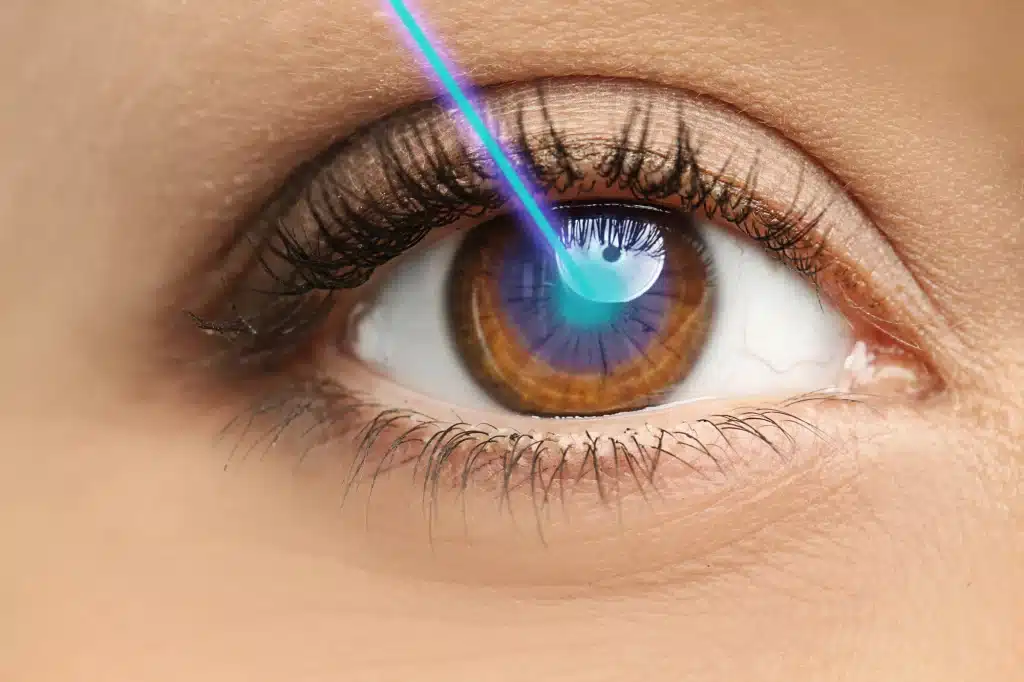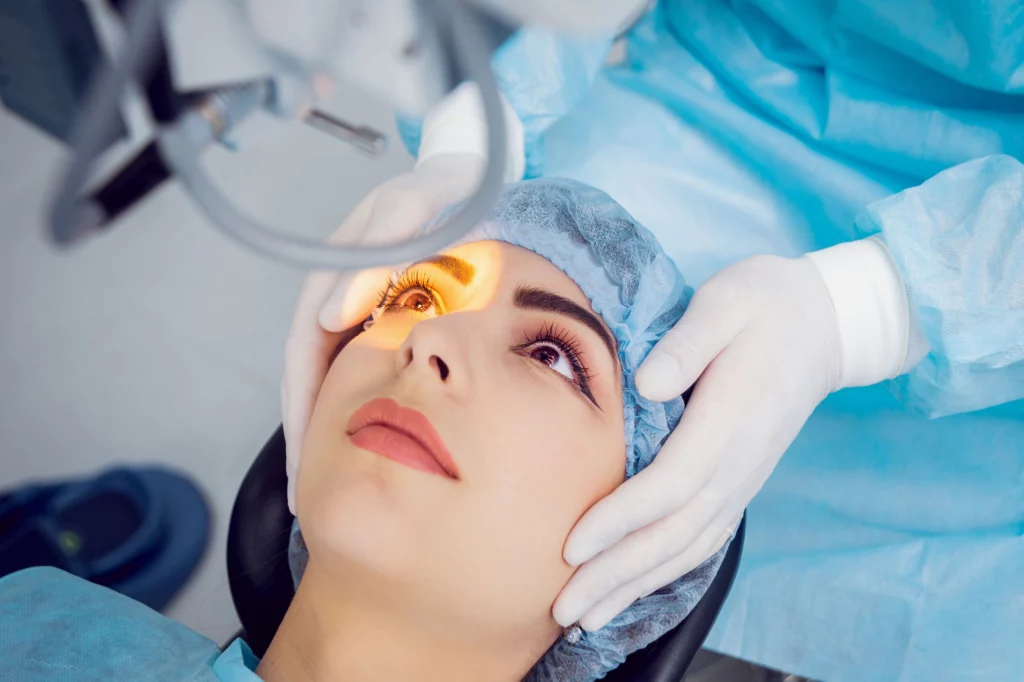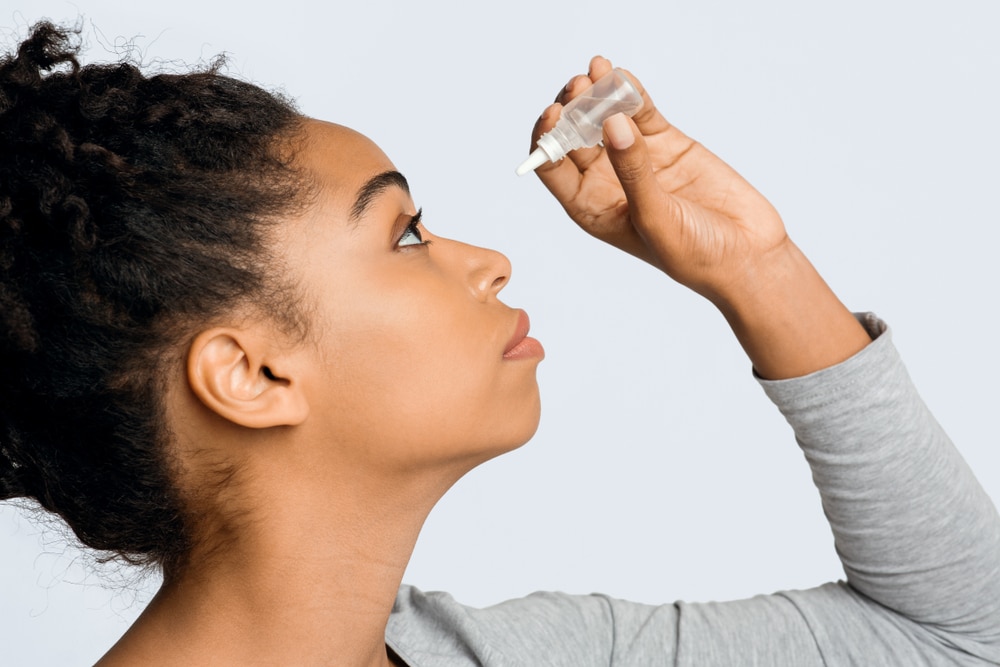Medically Reviewed by: Edward C. Wade, M.D., F.A.C.S.
Is PRK Eye Surgery Safe?
If you’ve been considering laser eye surgery, PRK might be on your radar, and may find yourself wondering, is PRK eye surgery safe?
Photorefractive keratectomy (PRK) is a type of laser eye surgery used to treat vision loss or astigmatism. What is the PRK success rate? According to the FDA, about 95% of PRK patients achieve 20/40 vision without the need for corrective lenses or glasses one year post-surgery. As with any medical procedure, there are risks, but PRK eye surgery is generally a very safe and predictable procedure with great outcomes.
With PRK, poor vision can be an ailment of the past. In this article, we’ll cover what you can expect during and after PRK eye surgery.
What happens during PRK eye surgery?
The PRK procedure itself is fairly short, lasting only around 15 minutes long. Your ophthalmologist will use numbing drops in your eyes before the procedure and offer an oral sedative if you feel you need it.
Then they will gently remove the top layer of the cornea, or the epithelium, and reshape the irregularities with a pulsing beam of ultraviolet light. The outer layer that was removed will regenerate while you’re healing. To help it along, your doctor will place a protective bandage over your eye. This eye bandage will be removed a few days after your procedure.
Recovery: the do’s and don’ts after PRK surgery
Recovery for PRK is a little longer than LASIK due to the nature of the surgery. In LASIK, the corneal flap can simply be realigned after the procedure. But in PRK, the outer layer that was scraped away needs time to grow back.
You may experience some slight discomfort and pain immediately after the surgery and for the first 24 to 36 hours after. It’s best to take off work for the first couple of days and avoid driving yourself home from the surgery. 90% recovery can take up to a month but you’ll be back to your normal activities a few days post-surgery.
Here are some other tips for the week following your PRK procedure:
- Do not rub or touch your eyes
- Avoid wearing eye makeup
- Avoid swimming, hot tubs, and dry or dusty environments
- You may shower, but do your best to avoid getting water in your eyes
- Do not drive until you receive your doctor’s approval
- Use post-operative drops as often as needed
- Wear your eye shields at night
- Use sunglasses for at least the first three days
If you have any questions or concerns about the recovery process, please contact your doctor.
The side effects of PRK
Some typical PRK surgery side effects to keep an eye out for in the first week of recovery include:
- Mild to moderate discomfort or itching
- Light sensitivity
- Seeing bursts or halos of light for the first few weeks
- Cloudy or hazy vision (corneal haze)
If you notice any unusual symptoms such as pus, swelling, and/or fever, or the above side effects persist, call your ophthalmologist immediately.
What are the long-term effects of PRK?
Is PRK safe long term? Generally speaking, PRK is a safe laser eye surgery with high rates of success. That said, although they are rare, there is always a chance for long-term risks. The main long-term risks of PRK include the loss of vision that cannot be corrected, double vision, severe eye damage, and night vision issues like seeing glares or halos at night.
What’s the difference between PRK vs. LASIK?
The biggest difference between LASIK and PRK is the procedure process itself and the recovery time. The cornea is reached by removing the outer layer in PRK, but in LASIK the doctor reaches the cornea through a corneal flap. This difference in technique accounts for a longer healing time for PRK patients. Waiting a few extra days for your PRK recovery can lead to year after year of clear vision and a vastly improved quality of life.
Continue reading: Is LASIK safe?
Wondering if you’re a good candidate for PRK? Learn more at Eye Center of Texas.
So, is PRK eye surgery safe? For most patients, PRK surgery in Houston is a perfectly safe laser eye surgery. It’s a great option for individuals who have certain structural variances, like a thin cornea or dry eyes, that make LASIK unsafe.
Wondering you could be a good candidate for PRK? Head into Eye Center of Texas! We have years of experience offering the most advanced refractive surgical techniques in Houston including PRK and LASIK. With cornea specialist and surgeon, Dr. Yasir Ahmed, you can rest assured that your vision is in the best hands. Contact us today to schedule a consultation.
More Helpful Articles by Eye Center of Texas:
- What Causes Floaters and Flashes in Eyes?
- Laser Treatment for Floaters: YAG Laser Vitreolysis
- Presbyopia Treatment Options in Houston
- Can Presbyopia be Corrected with LASIK?
- What Causes Presbyopia?
Related Articles
Financing Options Available
Apply today to find a financing option that meets your needs.
Our Locations
Houston/Bellaire
6565 W. Loop S., Suite 650Bellaire, TX 77401
Medical Office:
713-797-1010
Medical Fax:
713-357-7276
LASIK/Near Vision:
Office: 713-395-1515
Fax: 713-357-7278
Pasadena
4415 Crenshaw RoadPasadena, TX 77504
Medical Office:
281-977-8800
Medical Fax:
281-977-8877
Sugar Land
15200 S.W. Freeway, Suite 130Sugar Land, TX 77478
Medical Office:
281-277-1010
Medical Fax:
281-277-4504
Clear Lake
455 E. Medical Center Blvd., Suite 110Webster, TX 77598
Medical Office:
281-332-1397
Medical Fax:
281-282-9152
Katy
Greenhouse Medical Plaza2051 Greenhouse Road, Suite 110
Houston, TX 77084
Medical Office:
346-547-7070
Medical Fax:
281-214-2971
The Woodlands/Conroe
100 Medical Center Blvd., Suite 118Conroe, TX 77304
Medical Office:
936-647-1610
Medical Fax:
936-647-1620


